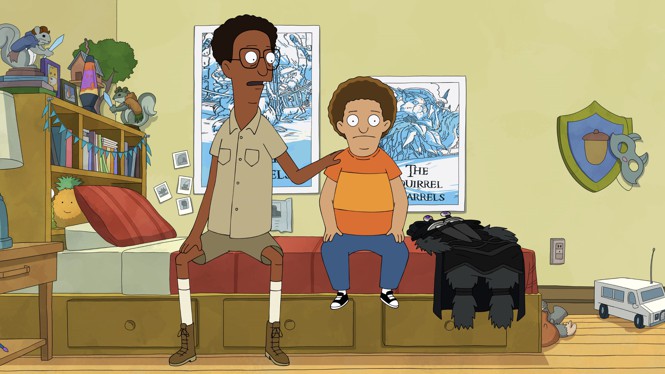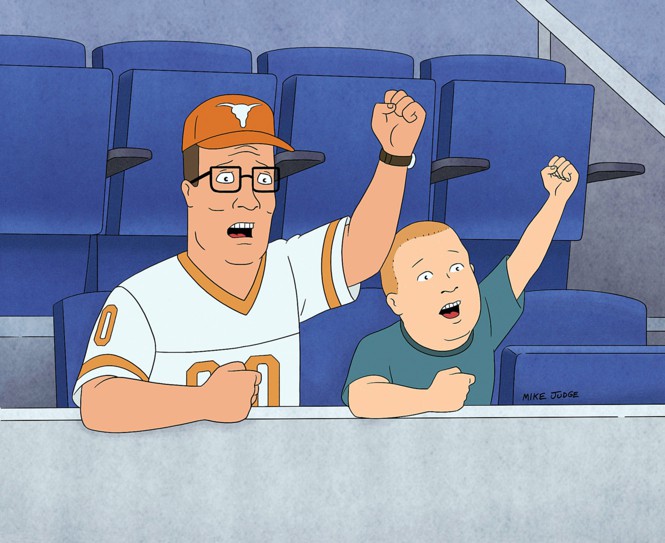
The latest season of Netflix’s animated comedy Big Mouth explores the mysterious world of father figures, and emerges with a revelation. The middle schooler Nick’s dad, Elliot Birch, has been harboring a secret: He used to be a fearsome competitor in the macho martial art of “Scottish nipple twisting.” Elliot is a sweetie pie, a family man who takes the concept of being a lover-not-a-fighter to the extreme. He’s a vocal feminist who kisses his male friends on the mouth and moisturizes as liberally as he praises his wife. So what gives? Elliot explains to Nick that he only ever engaged in the martial art to earn his own hypermasculine father’s approval. Eventually, Elliot left that life behind. “I vowed to myself that I’d be the exact opposite kind of father,” he explains to Nick. “You mean like a soft daddy?” Nick asks. “The softest, and the daddiest,” Elliot says.
Elliot made good on his vow: He’s likely the softest daddy around. And not only on Big Mouth, but probably in the contemporary animation canon—which is saying something, because today’s cartoon married men aren’t the patriarchs of the past. For decades, animated sitcoms frequently relied on cynical depictions of bad dads to make their audiences laugh: Think of the boorishness of Fred Flintstone or Family Guy’s Peter Griffin. Today’s “soft daddy” is a different—and welcome—archetype of domestic masculinity.

Soft daddies are the cartoon world’s new men: gentle, communicative, thoughtful. They’re Central Park’s Owen Tillerman taking his daughter bra shopping, Tatsu from the anime The Way of the Househusband leaving the yakuza to cook croquettes for his wife, Greg Universe co-parenting Steven with three space aliens. Soft daddies aren’t caricatures of beer-soused loutishness, anger-management issues, and laziness, unable to relate to their children and wife. They’re not South Park’s Randy Marsh drunkenly brawling at his kid’s Little League games, Homer Simpson strangling Bart, American Dad’s Stan Smith posing as a school bully to torment his own son. Sure, soft daddies make mistakes and have moments of frustration and buffoonery—they aren’t bastions of unimpeachable good, just as their predecessors aren’t uniformly deficient. But they can generally be relied on to make their world feel safer and more united.
Animated shows are particularly well-positioned to challenge gender norms. That’s in part because, unconstrained by plausibility, cartoons can use caricatures and exaggerated situations as vehicles for social critique, as Valerie Palmer-Mehta, a communication professor at Oakland University, argues in her essay “The Wisdom of Folly: Disrupting Masculinity in King of the Hill.” Hank Hill, the sad-eyed patriarch of King of the Hill, illustrates the medium’s ability to explore changing values.
A figure in between the bellowing dads and soft daddies, Hank is a man ill-adjusted to either role. Airing in the late ’90s through the early 2000s, the show captured the tension between “old” and “new” masculinity via the ambivalent relationship between Hank and his sensitive son, Bobby. Hank aspires to an idea of “manly” stoicism—he’s the kind of guy who resists medical care, no matter how constipated he is—but Bobby’s indifference to traditionally masculine activities like sports regularly drives Hank to fretful neuroticism. Both Hank and Bobby are played for laughs, but Bobby’s ridiculousness arises from his eccentric enthusiasms—becoming a rodeo clown, say, or a ventriloquist—whereas Hank’s stems from the distress he self-inflicts by convincing himself that his “boy ain’t right.” Often, King of the Hill ends on a conciliatory note, with father and son reaching a deeper mutual understanding—until the next episode, when Hank tenses up all over again.
In Bob’s Burgers—in some way a spiritual successor to King of the Hill, with the executive producer Jim Dauterive having worked on both—Bob Belcher approaches his own eccentric son, Gene, with more respectful curiosity than anxious disapproval. Bob doesn’t need regular life lessons to learn how to better empathize with his family, and he's not socializing his kids to have patriarchal values—he seems to operate from a softer place by default. Bob may not be the best businessman, but he is an emotional provider. His gentle parenting and ability to both work and have fun with his wife, Linda, imbue the show with a sense of security despite the family’s precarious existence on the poverty line. In no small part due to its tender patriarch, Bob’s Burgers pulls off a rare feat in the age-old genre of the sitcom: a portrayal of a family that’s functional and affectionate, but still funny.
Part of the soft daddy’s role is to highlight how a gentler masculinity is both a choice and, sometimes, a challenge. This season of Big Mouth reintroduces Elliot to his father and their old dynamic, in which love can be expressed only through ferocious nipple wrestling. (“There’s a new sheriff in town, and he is tough on titties!” Elliot announces, and yes, the irony of performatively heterosexual men obsessed with each other’s nugatory nipples is very much at play.) Meanwhile, the father of Nick’s friend Andrew, Marty Glouberman, causes his wife to leave the family house by being too controlling and cantankerous to support her interests outside the domestic sphere. Both men need help overcoming emotional blocks in order to keep their family together, and their difficulty doing so underscores that it’s a lot easier to be angry and alienated than compassionate and empathetic. Transitioning away from familiar, if harmful, ways of being can be an intimidating prospect at a societal or personal level, and especially both at once. By having characters ultimately choose softness, the arc of these stories suggests that toxic masculinity is a weakness to overcome, and that doing so makes one better able to give and receive love.
Soft daddies convey their love to the woman in their life by enacting what the UC Riverside feminist-studies professor Jane Ward calls “deep heterosexuality.” As Ward writes in her 2020 book, The Tragedy of Heterosexuality, husbands should see their wife not as a trophy to impress other men with and/or a mommy figure who provides care, but as a multidimensional human with her own desires and aspirations. Tatsu, the anime househusband, conveys his love for his wife, Miku, by supporting her career, preparing her a restorative feast when she’s exhausted from working overtime. Bob Belcher potty-trained three kids when Linda didn’t have the stomach for it, and he gamely attended a Downton Abbey–esque LARP because she wanted to go.

Such acts of spousal care may seem like they should be par for the course in any marriage. But many women, animated or not, might find themselves in a raw deal, acting, in the words of the writer Melanie Hamlett, as “best friend, lover, career advisor, stylist, social secretary, emotional cheerleader [and] mom” to men who don’t reciprocate that support. The artist Soolagna Majumdar created Marge Simpson Anime, an unofficial 2017 web comic about the Simpsons housewife’s pursuit of a new life, in order to explore the liberation of a character whose “whole identity” had been “formed by patriarchy,” she told Vice. On The Simpsons, Marge’s existence—full of chores and betrayals—could be considered tragic. Linda and Miku, however, seem happy: Their husbands see them as people.
Soft daddies’ negotiation of modern masculinity can enable jokes too, like when Elliot questions why anyone would find the label “pussy” offensive. “Since when did being called a beautiful genital become an insult?” he wonders aloud. But if people laugh at Homer Simpson and his ilk for their bellicose incompetency, the humor here lies in Elliot’s surplus of empathy. If one subtext of The Simpsons is that American society has low expectations for its men, the observation underlying the soft-daddy archetype is that men actually have so much more to offer. This might be what really distinguishes the soft daddy from other cartoon fathers: He is comedic, and also aspirational. As funny as Homer Simpson is, I’d rather have Elliot Birch as a dad.







